- Home
- Stephen R. Donaldson
The Illearth War Page 11
The Illearth War Read online
Page 11
In frustration, Covenant repeated sharply, “What do you expect me to do?”
Slowly Hyrim turned to face him squarely. “You have known Saltheart Foamfollower,” he said. “I wish you to come with us.”
Covenant gaped at the Lord in astonishment. He felt suddenly faint. From a distance, he heard himself asking weakly, “Does the High Lord know about this?”
Hyrim grinned. “Her anger will blister the skin of my face when she hears what I have said to you.” But a moment later, he was sober again. “Ur-Lord, I do not say that you should accompany us. Perhaps I am greatly wrong in my asking. There is much that we do not know concerning the Despiser’s intent for this war—and of these one of the greatest is our ignorance of the direction from which he will attack. Will he move south of Andelain as he has in past ages, and then strike northward through the Center Plains, or will he march north along Landsdrop to approach us from the east? This ignorance paralyzes our defense. The Warward cannot move until we know the answer. Warmark Troy is much concerned. But if Lord Foul chooses to assail us from the east, then our mission to Seareach will ride straight into his strength. For that reason, it would be unsurpassable folly for the white gold to accompany us.
“No, if it were wise for you to ride with us, Lord Mhoram would have spoken of it with you. Nevertheless I ask. I love the Giants deeply, ur-Lord. They are precious to all the Land. I would brave even High Lord Elena’s wrath to give them any aid.”
The simple sincerity of the Lord’s appeal touched Covenant. Though he had just met the man, he found that he liked Hyrim son of Hoole—liked him and wanted to help him. And the Giants were a powerful argument. He could not bear to think that Foamfollower, so full of life and laughter and comprehension, might be killed if he were not given aid. But that argument reminded Covenant bitterly that he was less capable of help than anyone in the Land. And Elena’s influence was still strong on him. He did not want to do anything to anger her, anything that would give her additional cause to hate him. He was torn; he could not answer the candid question in Hyrim’s gaze.
Abruptly the Lord’s eyes filled with tears. He looked away, blinking rapidly. “I have given you pain, ur-Lord,” he said softly. “Forgive me.” Covenant expected to hear irony, criticism, in the words, but Hyrim’s tone expressed only an uncomplex sorrow. When he faced Covenant again, his lips wore a lame smile. “Well, then. Will you not at least come with me to the courtyard? The mission will soon meet there to depart. Your presence will say to all Revelstone that you act from choice rather than from ignorance.”
That Covenant could not refuse; he was too ashamed of his essential impotence, too angry. Kicking himself vehemently into motion, he strode out of his suite.
At once, he found Bannor at his elbow. Between the Bloodguard and the Lord, he stalked downward through the halls and passages toward the gates of Revelstone.
There was only one entrance to Lord’s Keep, and the Giants had designed it well to defend the city. At the wedge tip of the plateau, they had hollowed out the stone to form a courtyard between the main Keep and the watchtower which protected the outer gates. Those gates—huge, interlocking stone slabs which could close inward to seal the entrance completely—led to a tunnel under the tower. The tunnel opened into the courtyard, and the entrance from the courtyard to the Keep was defended by another set of gates as massive and solid as the first. The main Keep was joined to the tower by a series of wooden crosswalks suspended at intervals above the court, but the only ground-level access to the tower was through two small doors on either side of the tunnel. Thus any enemy who accomplished the almost impossible task of breaking the outer gates would then have to attempt the same feat at the inner gates while under attack from the battlements of both the watchtower and the main Keep.
The courtyard was paved with flagstones except in the center, where an old Gilden tree grew, nourished by springs of fresh water. Lord Hyrim, Bannor, and Covenant found the rest of the mission there beside the tree, under the waning darkness of the sky. Dawn had begun.
Shivering in the crisp air, Covenant looked around the court. In the light which reflected from within the Keep, he could see that all the people near the tree were Bloodguard except for one Lord, a tall woman. She stood facing into Revelstone; Covenant could see her clearly. She had stiff, iron-gray hair that she wore cropped short; and her face was like the face of a hawk—keen of nose and eye, lean of cheek. Her eyes held a sharp gleam like the hunting stare of a hawk. But behind the gleam, Covenant discerned something that looked like an ache of desire, a yearning which she could neither satisfy nor repress.
Lord Hyrim greeted her companionably, but she ignored him, stared back into the Keep as if she could not bear to leave it.
Behind her, the Bloodguard were busy distributing burdens, packing their supplies into bundles with clingor thongs. These they tied to their backs so that their movements would not be hampered. Soon one of them—Covenant recognized Korik—stepped forward and announced to Lord Hyrim that he was ready.
“Ready, friend Korik?” Hyrim’s voice had a jaunty sound. “Ah, would that I could say the same. But, by the Seven! I am not a man suited for great dangers—I am better made to applaud victories than to perform them. Yes, that is where my skills lie. Were you to bring me a victory, I could drink a pledge to it which would astound you. But this—riding at speed across the Land, into the teeth of who knows what ravenous perils—! Can you tell us of these perils, Korik?”
“Lord?”
“I have given this matter thought, friend Korik—you may imagine how difficult it was for me. But I see that the High Lord gave this mission into your hands for good reason. Hear what I have thought—efforts like mine should not be wasted. Consider this. Of all the people of Revelstone, only the Bloodguard have known the Land before the Desecration. You have known Kevin himself. Surely you know far more of him than do we. And surely, also, you know far more of the Despiser. Perhaps you know how he wages war. Perhaps you know more than Lord Callindrill could tell us of the dangers which lie between us and Seareach.”
Korik shrugged slightly.
“It is in my heart,” Hyrim went on, “that you can measure the dangers ahead better than any Lord. You should speak of them, so that we may prepare. It may be that we should not risk Grimmerdhore or the Sarangrave, but should rather ride north and around, despite the added length of days.”
“The Bloodguard do not know the future.” Korik’s tone was impassive, yet Covenant heard a faint stress on the word know. Korik seemed to use that word in a different sense than Hyrim did, a larger or more prophetic sense.
And the Lord was unsatisfied. “Perhaps not. But you did not share Kevin’s reign and learn nothing. Do you fear we cannot endure the knowledge you bear?”
“Hyrim, you forget yourself,” Lord Shetra cut in abruptly. “Is this your respect for the keepers of the Vow?”
“Ah, sister Shetra, you misunderstand. My respect for the Bloodguard is unbounded. How could I feel otherwise about men sworn beyond any human oath to keep me alive? Now if they were to promise me good food, I would be totally in their debt. But surely you see where we stand. The High Lord has given this mission into their hands. If the peril we ride to meet so blithely forces them to the choice, the Bloodguard will pursue the mission rather than defend us.”
For a moment, Lord Shetra fixed Hyrim with a hard glance like an expression of contempt. But when she spoke, her voice did not impugn him. “Lord Hyrim, you are not blithe. You believe that the survival of the Giants rides on this mission, and you seek to conceal your fear for them.”
“Melenkurion Skyweir!” Hyrim growled to keep himself from laughing. “I seek only to preserve my fine and hard-won flesh from inconsiderate assault. It would become you to share such a worthy desire.”
“Peace, Lord. I have no heart for jesting,” sighed Shetra, and turned away to resume her study of Revelstone.
Lord Hyrim considered her in silence briefly, then said to Korik, “We
ll, she has less body to preserve than I have. It may be that fine spirit is reserved for neglected flesh. I must speak of this with the Giants if we reach them.”
“We are the Bloodguard,” answered Korik flatly. “We will gain Seareach.”
Hyrim glanced up at the night sky, and said in a soft, musing tone, “Summon or succor. Would that there were more of us. The Giants are vast, and if they are in need the need will be vast.”
“They are the Giants. Are they not equal to any need?”
The Lord flashed a look at Korik, but did not reply. Soon he moved to Shetra’s side, and said quietly, “Come, sister. The journey calls. The way is long, and if we hope to end we must first begin.”
“Wait!” she cried softly, like the distant scream of a bird.
Hyrim studied her for another moment. Then he came back to Covenant. In a whisper so low that Covenant could hardly hear it, the Lord said, “She desires to see Lord Verement her husband before we go. Theirs is a sad tale, ur-Lord. Their marriage is troubled. Both are proud— Together they made the journey to the Plains of Ra to offer themselves to the Ranyhyn. And the Ranyhyn—ah, the Ranyhyn chose her, but refused him.
“Well, they choose in their own way, and even the Ramen cannot explain them. But it has made a difference between these two. Brother Verement is a worthy man—yet now he has reason to believe himself unworthy. And sister Shetra can neither accept nor deny his self-judgment. And now this mission—Verement should rightly go in my place, but the mission requires the speed and endurance of the Ranyhyn. For her sake alone, I would wish that you might go in her stead.”
“I don’t ride Ranyhyn,” Covenant replied unsteadily.
“They would come to your call,” answered Hyrim. Again Covenant could not respond; he feared that this was true. The Ranyhyn had pledged themselves to him, and he had not released them. But he could not ride one of the great horses. They had reared to him out of fear and loathing. Again he had nothing to offer Hyrim but the look of his silent indecision.
Moments later, he heard movement in the throat of the Keep behind him. Turning, he saw two Lords striding out toward the courtyard—High Lord Elena and a man he had not met.
Elena’s arrival made him quail; at once, the air seemed to be full of wings, vulturine implications. But the man at her side also compelled his attention. He knew immediately that this was Lord Verement. The man resembled Shetra too much to be anyone else. He had the same short stiff hair, the same hawk-like features, the same bitter taste in his mouth. He moved toward her as if he meant to throw himself at her.
But he stopped ten feet away. His eyes winced away from her sharp gaze; he could not bring himself to look at her directly. In a low voice, he said, “Will you go?”
“You know that I must.”
They fell silent. Heedless of the fact that they were being observed, they stood apart from each other. Some test of will that needed no utterance hung between them. For a time, they remained still, as if refusing to make any gestures which might be interpreted as compromise or abdication.
“He did not wish to come,” Hyrim whispered to Covenant, “but the High Lord brought him. He is ashamed.”
Then Lord Verement moved. Abruptly he tossed his staff upright toward Shetra. She caught it, and threw her own staff to him. He caught it in turn. “Stay well, wife,” he said bleakly.
“Stay well, husband,” she replied.
“Nothing will be well for me until you return.”
“And for me also, my husband,” she breathed intensely.
Without another word, he turned on his heel and hastened back into Revelstone.
For a moment, she watched him go. Then she turned also, moved stiffly out of the courtyard into the tunnel. Korik and the other Bloodguard followed her. Shortly Covenant was left alone with Hyrim and Elena.
“Well, Hyrim,” the High Lord said gently, “your ordeal must begin. I regret that it will be so arduous for you.”
“High Lord—” Hyrim began.
“But you are capable of it,” she went on. “You have not begun to take the measure of your true strength.”
“High Lord,” Hyrim said, “I have asked ur-Lord Covenant to accompany us.”
She stiffened. Covenant felt a surge of tension radiate from her; she seemed suddenly to emanate a palpable tightness. “Lord Hyrim,” she said in a low voice, “you tread dangerous ground.” Her tone was hard, but Covenant could hear that she was not warning Hyrim, threatening him. She respected what he had done. And she was afraid.
Then she turned to Covenant. Carefully, as if she feared to express her own acute desire, she asked, “Will you go?”
The light from Revelstone was at her back, and he could not see her face. He was glad of this; he did not want to know whether or not her strange gaze was focused on him. He tried to answer her, but for a moment his throat was so dry that he could not make a sound.
“No,” he said at last. “No.” For Hyrim’s sake, he made an effort to tell the truth. “There’s nothing I can do for them.” But as he said it, he knew that that was not the whole truth. He refused to go because Elena daughter of Lena wanted him to stay.
Her relief was as tangible in the gloom as her tension had been. “Very well, ur-Lord.” For a long moment, she and Hyrim faced each other, and Covenant sensed the current of their silent communication, their mental melding. Then Hyrim stepped close to her and kissed her on the forehead. She hugged him, released him. He bowed to Covenant, and walked away into the tunnel.
In turn, she moved away from Covenant, entered the tower through one of the small doors beside the mouth of the tunnel. Covenant was left alone. He breathed deeply, trying to steady himself as if he had just come through an interrogation. Despite the coolness of the dawn, he was sweating. For a moment, he remained in the courtyard, uncertain of what to do. But then he heard whistling from outside the Keep—shrill piercing cries that echoed off the wall of Revelstone. Korik’s mission was calling the Ranyhyn.
At once, Covenant hurried into the tunnel.
Outside the shadowed court, the sky was lighter. In the east, the first rim of the sun had broken the horizon. Morning streamed westward, and in it fifteen Bloodguard and two Lords raised their call again. And again. While the echoes of the third cry faded, the air filled with the thunder of mighty hooves.
For a long moment, the earth rumbled to the beat of the Ranyhyn, and the sir pulsed deeply. Then a shadow swept up through the foothills. Seventeen strong, clean-limbed horses came surging and proud to Revelstone. Their white forehead stars looked like froth on a wave as they galloped toward the riders they had chosen to serve. With keen whinnying and the flash of hooves, they slowed their pace.
In response, the Bloodguard and the two Lords bowed, and Korik shouted, “Hail, Ranyhyn! Landriders and proud bearers! Sun-flesh and sky-mane, we are glad that you have heard our call. Evil and war are upon the Land! Peril and fatigue await the foes of Fangthane. Will you bear us?”
The great horses nodded and nickered as they came forward the last few steps to nuzzle their riders, urging them to mount. Instantly, all the Bloodguard leaped onto the backs of their Ranyhyn. They used no saddles or reins; the Ranyhyn bore their riders willingly, and replied to the pressure of a knee or the touch of a hand—even to the command of a thought. The same strange power of hearing which made it possible for them to answer their riders at once, anywhere in the Land—allowed them to sense the call tens or scores of days before it was actually uttered, and to run from the Plains of Ra to answer as if mere moments, not three or four hundred leagues, separated the southeast corner of the Land from any other region-also enabled them to act as one with their riders, a perfect meeting of mind and bone.
The Lords Shetra and Hyrim mounted more slowly, and Covenant watched them with a thickness in his throat, as if they were accepting a challenge which rightly belonged to him. Foamfollower, please— he thought. Please— But he could not articulate the words, Forgive me.
Then he heard
a shout behind and above him. Turning back toward Revelstone, he saw a small, slim figure standing with arms raised atop the watchtower—the High Lord. As the mounted company swung around to face her, she flourished the Staff of Law, drew from its tip an intense blue blaze that flared and coruscated against the deep sky—a paean of power which in her hands burned with a core of interfused blue and white turning to purest azure along the flame. Three times she waved the Staff, and its blaze was so bright that its path seemed to linger against the heavens. Then she cried, “Hail!” and thrust the Staff upward. For an instant the whole length of it flashed, so that an immense incandescent burst of Lordsfire sprang toward the sky. For that instant, she cast so much light over the feet of Revelstone that the dawn itself was effaced—as if to show the assembled company that she was strong enough to erase the fate written in the morning.
The Lords answered, wielding their own power and returning the vibrant cry, “Hail!” And the Bloodguard shouted together as one, “Fist and faith! Hail, High Lord!”
For a moment, all the staffs were upraised in fire. Then all the Lords silenced their flames. On that signal, the company of the mission wheeled in a smooth turn and galloped away into the sunrise.
EIGHT: “Lord Kevin’s Lament”
The departure of the mission—and his meeting with High Lord Elena the previous evening—left Covenant deeply disturbed. He seemed to be losing what little independence or authenticity he possessed. Instead of determining for himself what his position should be, and then acting according to that standard, he was allowing himself to be swayed, seduced even more fundamentally than he had been during his first experience with the Land. Already he had acknowledged Elena’s claim on him, and only that claim had prevented him from acknowledging the Giants as well.
He could not go on in this fashion. If he did, he would soon come to resemble Hile Troy—a man so overwhelmed by the power, of sight that he could not perceive the blindness of his desire to assume responsibility for the Land. That would be suicide for a leper. If he failed, he would die. And if he succeeded, he would never again be able to bear the numbness of his real life, his leprosy. He knew lepers who had died that way, but for them the death was never quick, never clean. Their ends lay beyond a fetid ugliness so abominable that he felt nauseated whenever he remembered that such putrefaction existed.

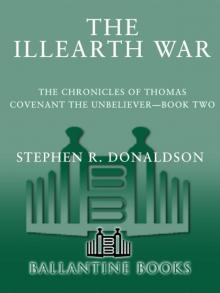 The Illearth War
The Illearth War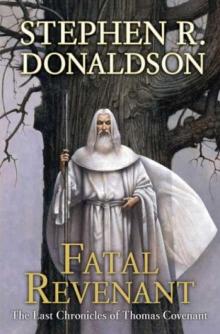 Last Chronicles of Thomas Covenant 02 - Fatal Revenant
Last Chronicles of Thomas Covenant 02 - Fatal Revenant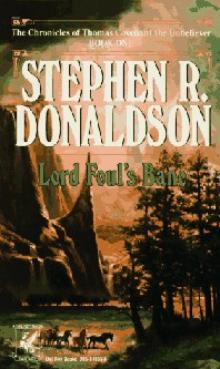 Lord Foul's Bane
Lord Foul's Bane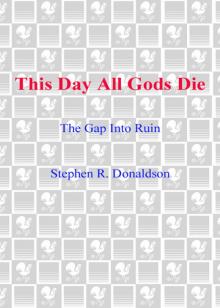 The Gap Into Ruin: This Day All Gods Die
The Gap Into Ruin: This Day All Gods Die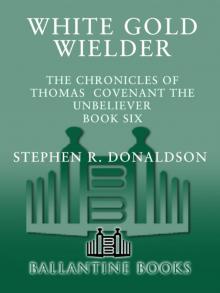 White Gold Wielder
White Gold Wielder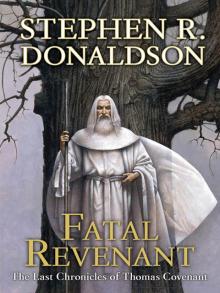 Fatal Revenant
Fatal Revenant The Mirror of Her Dreams
The Mirror of Her Dreams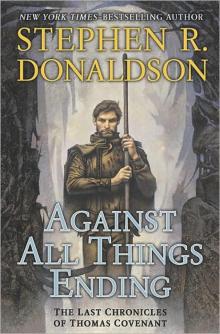 Against All Things Ending
Against All Things Ending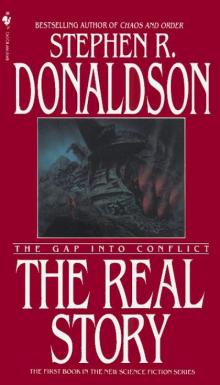 The Real Story: The Gap Into Conflict
The Real Story: The Gap Into Conflict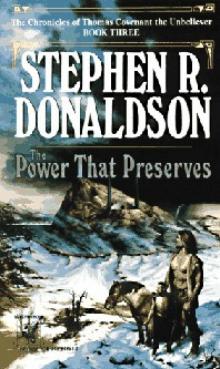 The Power That Preserves
The Power That Preserves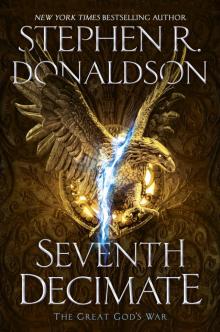 Seventh Decimate
Seventh Decimate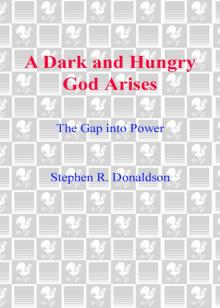 The Gap Into Power: A Dark and Hungry God Arises
The Gap Into Power: A Dark and Hungry God Arises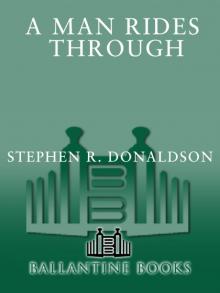 A Man Rides Through
A Man Rides Through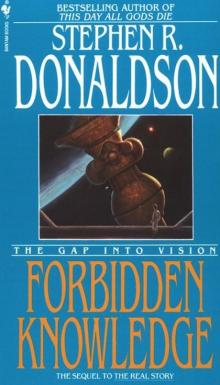 The Gap Into Vision: Forbidden Knowledge
The Gap Into Vision: Forbidden Knowledge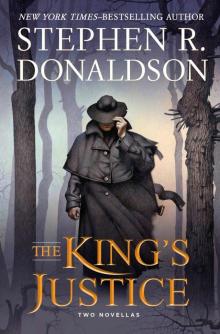 The King's Justice: Two Novellas
The King's Justice: Two Novellas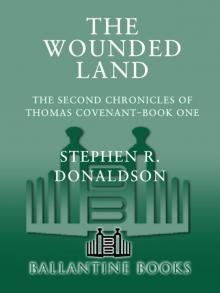 The Wounded Land
The Wounded Land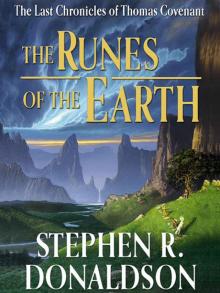 The Runes of the Earth
The Runes of the Earth Mordant's Need
Mordant's Need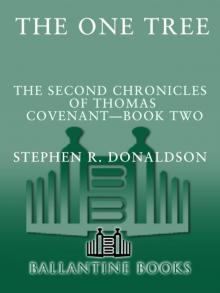 The One Tree
The One Tree Gilden-Fire
Gilden-Fire Reave the Just and Other Tales
Reave the Just and Other Tales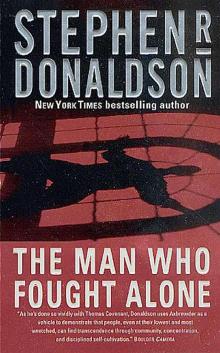 The Man Who Fought Alone
The Man Who Fought Alone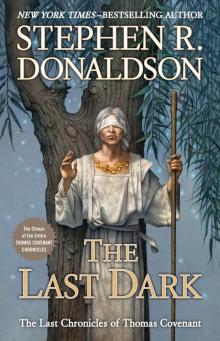 The Last Dark
The Last Dark The Man Who Tried to Get Away
The Man Who Tried to Get Away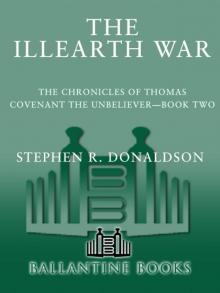 Thomas Covenant 02: The Illearth War
Thomas Covenant 02: The Illearth War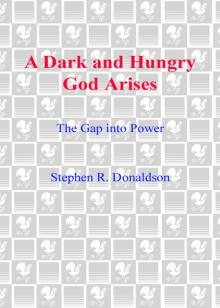 A Dark and Hungry God Arises
A Dark and Hungry God Arises The One Tree t2cotc-2
The One Tree t2cotc-2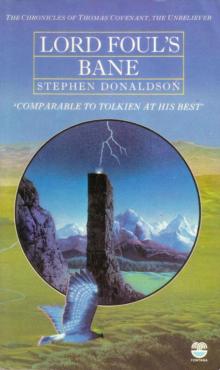 Lord Foul's Bane cotc-1
Lord Foul's Bane cotc-1 The Illearth War t1cotc-2
The Illearth War t1cotc-2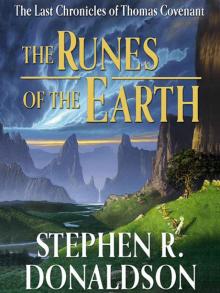 The Runes of the Earth: The Last Chronicles of Thomas Covenant - Book One
The Runes of the Earth: The Last Chronicles of Thomas Covenant - Book One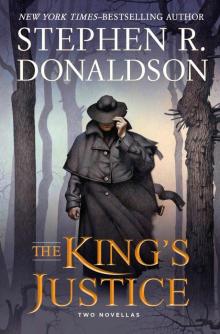 The King's Justice
The King's Justice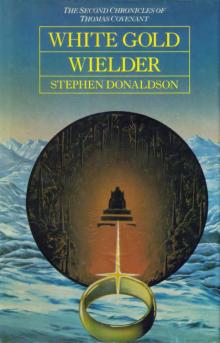 White Gold Wielder t2cotc-3
White Gold Wielder t2cotc-3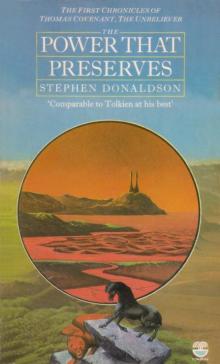 The Power That Preserves t1cotc-3
The Power That Preserves t1cotc-3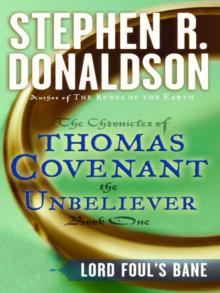 Thomas Covenant 01: Lord Foul's Bane
Thomas Covenant 01: Lord Foul's Bane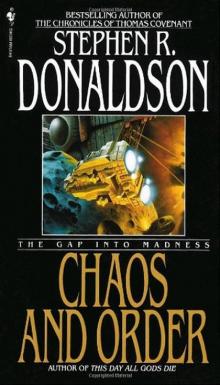 Chaos and Order: The Gap Into Madness
Chaos and Order: The Gap Into Madness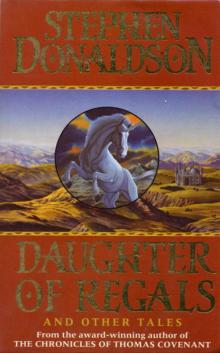 Daughter of Regals
Daughter of Regals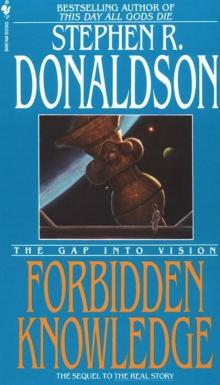 Forbidden Knowledge: The Gap Into Vision
Forbidden Knowledge: The Gap Into Vision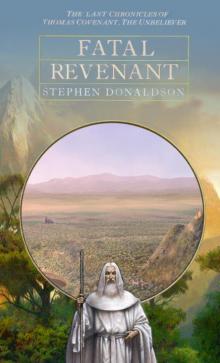 Fatal Revenant t3cotc-2
Fatal Revenant t3cotc-2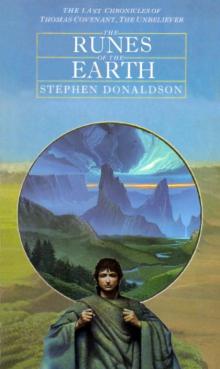 The Runes of the Earth t3cotc-1
The Runes of the Earth t3cotc-1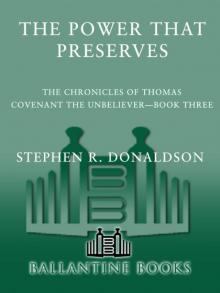 Thomas Covenant 03: Power That Preserves
Thomas Covenant 03: Power That Preserves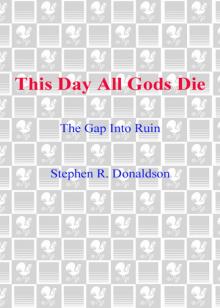 This Day all Gods Die: The Gap into Ruin
This Day all Gods Die: The Gap into Ruin The Wounded Land t2cotc-1
The Wounded Land t2cotc-1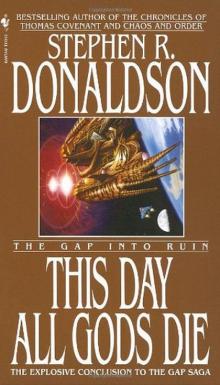 This Day All Gods Die
This Day All Gods Die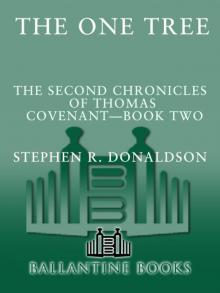 One Tree
One Tree